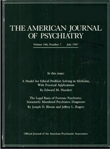Stability of mood despite HIV illness progression in a group of homosexual men
Abstract
OBJECTIVE: The authors investigated the association between mood status and progression of HIV illness. METHOD: In a research clinic at a university medical center, 112 HIV-positive and 52 HIV-negative homosexual men were enrolled in a 4-year prospective study with semi- annual assessments. The main study measures were psychiatric diagnoses according to the Structured Clinical Interview for DSM-III-R; level of functioning and psychiatric symptoms according to the Global Assessment of Functioning Scale (axis V, DSM-III-R), the Hamilton depression and anxiety scales, the Brief Symptom Inventory, and the Beck Hopelessness Scale; stage of HIV illness; and CD4 cell count. RESULTS: Among the HIV- positive men, there was no increase in rates of syndromal depression and anxiety over the 4 years despite substantial HIV illness progression. On all occasions, mean psychopathology symptom ratings were within the normal or not depressed range. However, compared to the HIV-negative men, the HIV-positive men had slightly more anxiety and somatic depressive symptoms throughout. The only measure that showed an increase in distress over time was orientation to the future; among the HIV-positive men, hopes for the future waned across assessments. Attrition in the group was largely attributable to the loss of men with lower CD4 cell counts and more advanced HIV illness. However, study dropouts did not differ on any psychiatric measure from subjects who remained during the first 3 years. CONCLUSIONS: In this group no significant increase in syndromal or symptomatic depression or anxiety over nine semiannual assessments was found, despite substantial HIV illness progression and some deaths. Psychopathology did not predict dropout or death.



